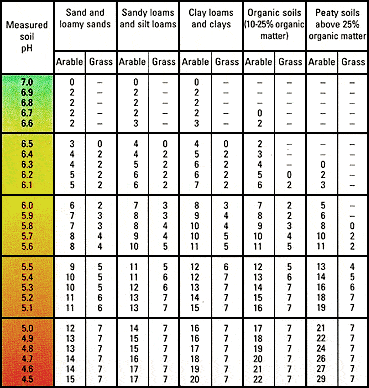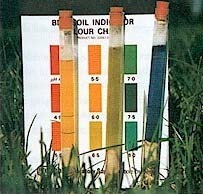|
The degree of soil acidity or alkalinity is measured by what is known as the pH scale. A figure of pH 7 represents a materials relationship to the neutral position of pure water at pH 7.0. Figures below 7 indicate increasing acidity and above 7 increasing alkalinity.
The optimum for general cropping is between pH 6.8 and 7.0. For permanent grassland the optimum pH is slightly lower.
There are several methods of testing the pH of soils and with some knowledge of the relationship between pH and lime requirement for various soil types the pH can be used as a guide to the lime requirement.
ALA LIME APPLICATION RECOMMENDATIONS
(tonnes/hectare*)

multiply by 0.4047 to obtain tonnes per acre
NOTES
- Recommendations based on soil depths of 200mm/8in (arable) and 150mm /6in (grassland). Greater depths of soil will require more lime.
- Maximum surface application for grass is 7 tonne/ha (3 tonne/acre). Minimum application rate: 2 tonne/ha (1 tonne/acre). Where application rates of over 10 tonnes/ha (4 tonnes/acre) are necessary on arable land the ALA recommends that lime should be applied as two dressings (first dressing ploughed in).
- The application rates shown are based on material having a neutralising value of 54 and fineness of 40% passing 150 microns. When using other materials permitted under the Fertiliser Regulations the dressing should be adjusted accordingly. Thus coarser materials and those having a lower neutralising value will also require a heavier dressing.
SAMPLING FOR ASSESSMENT OF LIME REQUIREMENTS
Soil samples should be taken methodically from a number of places in
the field and tested individually since acidity frequently occurs in patches
in the field. Test results should be plotted on a field map so that any
lime required may be applied in the right place and at the correct and
most economic rate. Although poor and patchy crop performance and the
presence of acid loving weed species are rough indications of lime deficiency,
the acid reaction to indicator solution or pH meter is the only reliable
method of assessing lime requirements.
See nutrient availability and
crop growth diagram.
Reports based on bulk wholefield samples are rarely reliable for lime
status as they average out variations across fields and fail to identify
the deficient areas
 |
Assessing soil lime status requires good sampling
and analytical procedures. |
|



